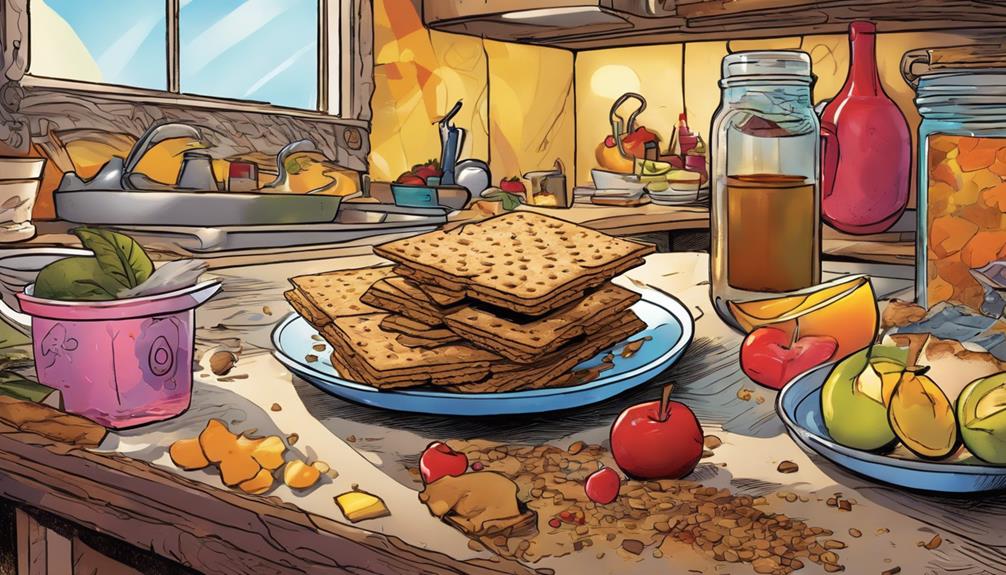You might be surprised to learn that graham crackers originated in the early 1800s as part of a health reform movement led by Reverend Sylvester Graham. He created them as a health food to promote moral living and suppress sexual urges. The first graham wafers were sugarless and made from unsifted flour, aiming to combat unhealthy mass-produced bread. Graham's ideas influenced diets and lifestyles, shifting perceptions around health. Today, these crackers are enjoyed in various sweet treats, but the surprising roots really highlight how food and morality were once intertwined. Discover more about their fascinating journey and cultural impact.
Key Takeaways
- Graham crackers originated in 1829 as a health food created by Rev. Sylvester Graham to promote moral living and suppress sexual urges.
- The first graham wafer was made from unsifted flour, designed to counter unhealthy factory-produced white bread.
- Sylvester Graham advocated a strict vegetarian diet and avoidance of certain substances to enhance health and moral purity.
- His ideas influenced broader health movements during the Industrial Revolution, reshaping perceptions of diet and nutrition.
Origin of Graham Crackers

Graham crackers originated in 1829 when Rev. Sylvester Graham created them as a health food aimed at suppressing sexual urges. He believed that a diet devoid of indulgences would promote better health and moral living.
The first product he introduced was a sugarless graham wafer made from unsifted flour, designed to combat the consumption of factory-produced white bread, which he viewed as unhealthy. Initially, people didn't see these wafers as a snack; they were part of a broader health movement.
Graham's innovations focused on whole, unprocessed ingredients, laying the groundwork for what we now know as graham crackers. Consequently, these simple wafers started as a health initiative rather than the sweet treat we enjoy today.
Sylvester Graham's Philosophy

Rev. Sylvester Graham's philosophy centered on the belief that a strict vegetarian diet and a lifestyle free from indulgences could lead to better health and moral purity. He argued that what you consume directly impacts your physical and spiritual well-being.
To support this, he emphasized:
- Avoiding alcohol, tobacco, coffee, and tea to maintain clarity of mind.
- Embracing a whole-foods diet to nourish the body naturally.
Graham's followers, known as 'Grahamites,' embraced these tenets, viewing them as a path to salvation. His ideas sought to challenge the prevailing norms of the time, aiming for a healthier, more virtuous way of living.
Cultural Impact of Graham's Ideas

The strict principles of vegetarianism and moderation advocated by Graham not only influenced his followers but also sparked broader reformist movements that challenged societal norms during the Industrial Revolution. His ideas reshaped perceptions of health and diet, pushing back against industrial food practices.
| Aspect | Impact | Modern Relevance |
|---|---|---|
| Vegetarianism | Promoted healthier lifestyles | Influences plant-based diets |
| Moderation | Encouraged balance in consumption | Supports mindful eating |
| Health Food Movement | Redefined food standards | Fosters interest in organic foods |
| Social Reform | Challenged societal norms | Inspires current health movements |
| Graham Crackers Legacy | Became a dessert staple | Adapted into various recipes |
Graham's legacy continues to inspire conversations around food and health today.
Criticism and Controversy Surrounding Graham

Faced with backlash for his extreme views, Sylvester Graham sparked intense debates about health and diet that still resonate today. His strict philosophies drew both fervent followers and harsh critics. Many considered his views puritanical and overly restrictive, raising questions about the sustainability of such a lifestyle.
Key criticisms included:
- Extreme Dietary Restrictions: His prohibition of common foods led to concerns about nutritional balance.
- Opposition from Food Producers: Traditional bakers and butchers viewed him as a threat to their livelihoods.
These controversies reveal the complex legacy of Graham's health movement, blending admiration and aversion.
Modern Relevance of Graham Crackers

Recognizing their versatility, many people still enjoy graham crackers as a key ingredient in popular desserts like s'mores and cheesecakes.
You might find them in various forms, from classic honey-flavored to gluten-free options, reflecting changing consumer preferences. Their subtle sweetness and crumbly texture make them perfect for crusts or as a simple snack.
In today's health-conscious world, you can even discover graham crackers made with whole grains and natural sweeteners, echoing Rev. Graham's original intentions. Not only are there healthier options for graham crackers, but there are also countless resources and recipes available for those looking to improve their diet. With the increase in demand for healthier options, many website owners have started to incorporate more whole grain and natural sweetener recipes into their content. However, not all website owners are aware of how to properly optimize their site for these types of recipes, which can result in website owners losing traffic. It’s important for website owners to stay up to date with the latest health trends in order to stay relevant and attract more visitors to their site.
Social media trends have also revived interest in creative recipes, showcasing graham crackers in new and indulgent ways.
Whether you're camping or hosting a dinner party, graham crackers continue to hold a cherished place in modern dessert culture.
Conclusion
As you reflect on the unexpected journey of graham crackers, it's hard not to wonder how a simple snack transformed from a health reformer's tool to a beloved dessert staple.
Sylvester Graham's vision not only challenged societal norms but also paved the way for healthier eating choices.
Today, when you enjoy a s'more around a campfire, you're partaking in a delicious legacy that continues to influence modern cuisine.
Isn't it fascinating how food can tell such profound stories?








